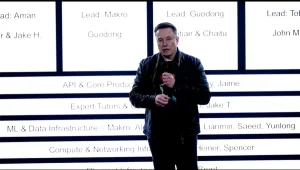AI Innovation or Political Censorship? The Controversy Surrounding Kling

A new video-generating AI model, Kling, is making waves not just for its impressive capabilities but also for its controversial limitations. Developed by a Beijing-based company, this powerful AI can generate high-quality, short videos. However, it deliberately avoids politically sensitive subjects, yielding non-specific error messages instead. This raises questions about the balance between technological innovation and political control.
As users explore Kling’s functionalities, many discover that prompts like ‘Democracy in China’ or ‘Tiananmen Square protests’ are off-limits. This filtering mechanism seems to be implemented at the prompt level, restricting the AI from generating certain politically charged content. Consequently, Kling reflects the broader, intricate relationship between technology and politics in China.
Censorship in Video-Generating AI
A powerful new video-generating AI model, developed by a Beijing-based company, is now available worldwide. However, it seems to have built-in limitations. The model, Kling, will not create videos on politically sensitive subjects such as “Democracy in China” or “Tiananmen Square protests.” Prompts regarding these topics return a non-specific error message.
The exact mechanism of this filtering appears to be at the prompt level. While Kling can animate still images, it avoids generating videos on sensitive topics if the prompt includes restricted words. For example, it can generate a video of a man giving a speech, but it cannot do so if the man is identified as Chinese President Xi Jinping.
The reasons behind Kling’s behavior are likely due to significant political pressures from the Chinese government. According to recent reports, AI models in China are under strict scrutiny by the Cyberspace Administration of China (CAC). The CAC ensures that AI responses align with core socialist values. Companies must prepare thousands of questions for government review to test whether their models produce politically safe answers.
These measures seem to be creating two classes of AI in China: those with heavy filtering and those without. This division could impact the broader AI ecosystem, potentially slowing down AI advancements in China. The focus on ideological guardrails may hamper the development and deployment of AI technologies.
Chinese regulations are leading to the creation of extensive ideological guardrails for AI models. These guardrails are meant to filter out politically sensitive topics. However, such measures require significant resources and time to implement.
This was evident last year when the BBC reported on Baidu’s chatbot model, Ernie. The chatbot evaded questions on politically controversial subjects, indicating that substantial efforts had been made to ensure compliance with government standards.
Kling exemplifies the growing divide in AI capabilities. On one side, there are models that adhere strictly to Chinese regulations. On the other, there are models with fewer constraints. As long as these regulations remain, Chinese AI companies will need to navigate a complex landscape to ensure compliance while striving for innovation.
From a user perspective, Kling delivers on its promise to generate high-quality, short videos. Users input prompts and the model generates five-second clips in about a minute or two. The videos are in 720p and simulate real-world physics, such as the movement of leaves and water.
However, users quickly notice the limitations when they attempt to generate content on sensitive topics. These restrictions could be frustrating for users who seek to explore a broader range of subjects using the model.
Despite these constraints, Kling’s performance in generating non-sensitive content remains impressive. It competes well with other video-generating models in the market, showcasing advanced capabilities in animation and physics simulation.
Kling is often compared to other video-generating models like Runway’s Gen-3 and OpenAI’s Sora. In terms of quality, Kling is on par with these other models. It generates videos that closely adhere to the user’s prompts and offers impressive visual and animation quality.
However, Kling’s unique limitation is its restrictive filtering on sensitive topics. Other models like Gen-3 and Sora do not have such stringent filters. This makes Kling stand out not just for its technical capabilities but also for the boundaries it sets.
The comparison highlights the impact of political interference on AI technology. While Kling showcases Chinese advancements in AI, it also demonstrates the influence of government regulations on technological development.
Implications for the AI Ecosystem
The political pressures and resulting censorship in models like Kling have broader implications for the AI ecosystem. The stringent requirements and filtering mechanisms may slow down AI innovation in China. Companies need to balance compliance with innovation, which can be a challenging task.
Emerging AI models will likely continue to reflect the regulatory environments in which they are developed. Therefore, users and developers must understand these constraints and their potential impact on AI capabilities.
As the AI landscape evolves, the divide between heavily regulated and less constrained models could become more pronounced. This could influence global AI developments and lead to varied approaches to AI governance and regulation.
Looking forward, it remains to be seen how Chinese AI companies will navigate the complex landscape of government regulations and technological innovation. The balance between adhering to political guidelines and pushing the boundaries of AI capabilities will continue to be a significant challenge.
For now, models like Kling offer a glimpse into the future of AI under strict regulatory oversight. While they showcase impressive technological advancements, they also highlight the limitations imposed by political considerations.
Kling represents a significant innovation in AI video generation, yet it comes with notable limitations reflective of its political environment. As the AI landscape continues to evolve, the balance between technological advancement and regulatory compliance will shape future developments. Users and developers alike must navigate these complexities while striving for innovation.





